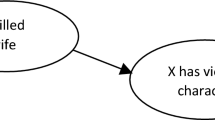Abstract
An important need of the criminal justice system is to better understand and structure discretionary decisions, thereby minimizing their adverse effects. The present study explored the relevance of models of attribution processes to these goals by analysing judges' verbal statements in real courtroom settings. Results reveal that these models are useful in studying discretion and that the method is a fruitful component of a multimethodological approach to studying both attribution and discretion. The importance of both developing and testing models in real life contexts was stressed.
Similar content being viewed by others
Reference Note
Dorch, E. Prosecutorial discretion. Unpublished M.A. thesis, University of Missouri, Kansas City, 1978.
References
Allport, G. W.The Nature of Prejudice. Reading, Massachusetts: Addison-Wesley, 1954.
Bermant, G., McGuire, M., McKinley, W., and Salo, C. The logic of simulation in jury research.Criminal Justice and Behavior, 1974,1(3), 221–223.
Carroll, J. S., & Payne, J. W. Judgements about crime and the criminal: A model and a method for investigating parole decisions. In B. D. Sales (Ed.),Perspectives in Law and Psychology, Vol. 1: The Criminal Justice System. New York: Plenum, 1977.
Davis, K. C.Discretionary Justice: A Preliminary Inquiry. Baton Rouge, Louisiana: Louisiana State University Press, 1969.
Ebbesen, E. B., & Konechi, V. J. Decision making and information integration in the courts: the setting of bail.Journal of Personality and Social Psychology, 1975,32, 805–821.
Fontaine, G. Social comparison and some determinants of expected personal control and expected performance in a novel task situation.Journal of Personality and Social Psychology, 1974,29, 487–496.
Fontaine, G. Causal attribution in simulated versus real situations: When are people logical, when are they not?Journal of Personality and Social Psychology, 1975,32, 1021–1029.
Fontaine, G., & Kiger, R. The effects of defendant dress and supervision on judgments of simulated jurors.Law and Human Behavior, 1978,2, 75–83.
Frieze, I., & Weiner, B. Cue utilization and attributional judgments for success and failure.Journal of Personality, 1971,39, 591–605.
Hamilton, P. L. Cognitive biases in the perception of social groups. In J. S. Carroll and J. W. Payne (Eds.),Cognition and Social Behavior. Hillsdale, New Jersey: Lawrence Erlbaum Associates, 1976.
Heider, F.The Psychology of Interpersonal Relations. New York: Wiley, 1958.
Jones, E. E., & Davis, K. E. From acts to dispositions. In L. Berkowitz (Ed.),Advances in Experimental Social Psychology, Vol. 2. New York: Academic Press, 1965.
Jones, E. E., & McGillis, D. Correspondent inferences and the attribution cube: A comparative reappraisal. In J. H. Harvey et al. (Eds.),New Directions in Attribution Research, Vol. 1. New York: Wiley, 1976.
Kelley, H. H. Attribution theory in social psychology. In D. Levine (Ed.),Nebraska Symposium on Motivation. Lincoln: University of Nebraska Press, 1967.
Kelley, H. H. The process of causal attribution.American Psychologist, 1973,28, 107–128.
Lippman, W.Public Opinion. New York: Harcourt Brace, 1922.
McArthur, L. A. The how and what of why: some determinants and consequences of causal attribution.Journal of Personality and Social Psychology, 1972,22, 171–193.
National Advisory Commission on Criminal Justice Standards and Goals,Courts. Washington, D.C.: U.S. Government Printing Office, 1973.
Newell, A., & Simon, H. A.Human Problem Solving. Englewood Cliffs, New Jersey: Prentice-Hall, 1972.
Payne, J. W. Braunstein, M. L., & Carroll, J. S. Exploring predecisional behavior: an alternative approach to decision research.Organizational Behavior and Human Performance, 1978,22, 17–44.
Shaver, K. G., Gilbert, M. A., & Williams, M. D. Social psychology criminal justice and the principle of discretion: a selective review.Personality and Social Psychology Bulletin, 1955,1, 471–484.
Snyder, M. L., Stephan, W. G., & Rosenfield, D. Attributional egotism. In J. H. Harvey et al. (Eds.),New Directions in Attribution Research, Vol. 1. New York: Wiley, 1978.
Stephan, C. Selectivity characteristics of jurors and litigants: their influences on juries' verdicts. In R. J. Simon (Ed.),The Jury System in America: A Critical Overview, Beverly Hills, California: Sage, 1975.
Weiner, B., Heckhausen, H., Meyer, W., & Cook, R. E. Causal ascriptions and achievement behavior: conceptual analysis of effort and reanalysis of locus of control.Journal of Personality and Social Psychology, 1972,21, 239–248.
Author information
Authors and Affiliations
Additional information
The authors thank Janice Bryan and Patsi Roberts for their help in data collection.
About this article
Cite this article
Fontaine, G., Emily, C. Causal attribution and judicial discretion. Law Hum Behav 2, 323–337 (1978). https://doi.org/10.1007/BF01038985
Issue Date:
DOI: https://doi.org/10.1007/BF01038985




